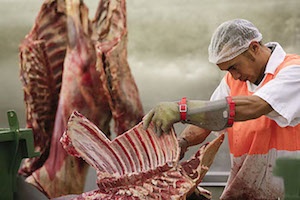Europe's fastest growing plant-based meat markets: Germany, Italy, Romania and Portugal
Plant-based meat market growth in Europe
Plant-based meat sales in Europe amounted to €2.01 billion in 2022, up 3% from €1.96 million achieved in 2021 and 19% from €1.69 million in 2020 . Plant-based meats accounted for 35% of alternative meat sales in Europe. Retail sales in the plant-based food category amounted to €5.8 billion in 2022. As shown in Figure 1, plant-based meat sales in Europe have been growing significantly and consistently in recent years. By volume, plant-based meat sales grew 1% in 2022 to 846 million units, with sales volume up 21% from 2020. The plant-based meat market is expected to grow at a CAGR of 10% between 2023 and 2028, suggesting a steady growth rate in the coming years. Countries such as Germany , Italy , Portugal and Romania are driving the growth of the plant-based meat alternative market. On the other hand, countries such as the UK and the Netherlands are stable, mature markets that are not expected to grow significantly in the future.
Source: NielsenIQ, GFI, Tridge.
Large and developed markets - UK and Netherlands
Although major markets, the UK and the Netherlands showed negative growth in 2022 (-8% and 2% respectively) and only modest growth since 2020 (1% and 2% respectively), as shown in Figure 3. Meat Markets plant origin in these countries are relatively mature, as evidenced by the high per capita expenditure: €7.9 in the UK and €12.6 in the Netherlands. The UK and Netherlands also have a high proportion of total retail spending on plant-based meats going to plant-based meats, at 49% and 54% respectively. This is further evidence of the maturity of the plant-based meat sector in these countries. Given these factors, the plant-based meat markets in the UK and the Netherlands are not expected to experience high growth rates in the coming years, but rather will continue to grow at a slow and steady pace.
Source: GFI, Tridge.
Europe's fastest growing markets
Germany is the largest plant-based meat market in Europe, as shown in Figure 2, with retail sales of €642.8 million in 2022. It has grown significantly in recent years: by 7% in 2022 and by an impressive 40% from 2020. also shows a significant reduction in animal meat consumption (58%): 40% of Germans identify as flexitarians, and 25% of Germans express an intention to consume more plant-based meat in the coming years. Plant-based meat makes up 34% of Germany's €1.91 billion plant-based retail spend and is the largest plant-based food category, highlighting the central role of plant-based meat in the German diet. Germany has a relatively high per capita spend on plant-based meat at €7.7, but there is still plenty of room for growth with countries such as the Netherlands at €12.6 per capita. Germany is therefore expected to experience double-digit growth in the plant-based meat market in the coming years.
Italy has also shown strong growth in recent years, increasing by 12% in 2022 to €168.4 million and by 40% from 2020, consolidating its place as the fourth largest plant-based meat market in Europe. Like Germany, Italy shows a high level of reduction in animal meat consumption - by 59%. Italy still has a relatively low level of flexitarians at 23%, and only 25% of total spending on alternative meats comes from plant-based meats. Combined with the low cost of plant-based meat (€2.9), it can be concluded that the Italian plant-based meat industry still has significant room for growth. In addition, 22% of Italian consumers expressed their intention to consume more plant-based meat in the coming years. Based on this information, like Germany, Italy is expected to experience double-digit growth in retail sales of plant-based products in the coming years.
Source: GFI, Tridge.
Romania ranked second in terms of retail spending on plant-based meat in 2022, with €9.8 million. Romania had the highest growth in 2022 at 28%, and since 2020 the figure has increased by 83%. Romania also has the lowest per capita spending on plant-based meat at 0.5 euros. The plant-based meat industry in Romania is still in its infancy but is growing rapidly. In 2022, plant-based meat accounted for 30% of Romania's total spending on plant-based products, further highlighting the growth opportunities. The rapid growth rate of plant-based meat consumption in Romania is expected to continue in the coming years, given the opportunities for growth. Romania represents a promising opportunity for companies looking to enter a smaller market with rapid growth.
Portugal presents a similar situation and opportunity. Portugal is the smallest plant-based meat market in Europe (€7.6 million in 2022), but has shown the highest growth rate since 2020 at 85% and growing 19% in 2022. Plant-based meats also make up just 12% of Portugal's total spending on plant-based products. This, coupled with low per capita costs of €0.7 in 2022, highlights the infancy of the plant-based meat sector in Portugal. The plant-based meat sector in Portugal will therefore continue to grow rapidly, with double-digit growth expected in the coming years. Portugal also represents a promising opportunity for companies wishing to enter Europe's small, fast-growing market.
The European plant-based meat market is expected to continue to experience double-digit growth in the coming years. The situation is characterized by countries with mature and stable plant-based meat markets that are not expected to grow rapidly in the coming years, such as the UK, the Netherlands, Sweden, Belgium and Denmark. However, other countries are experiencing rapid growth in the plant-based meat market and are expected to continue to show growth in the coming years, such as Germany, Italy, Romania and Portugal.





























































